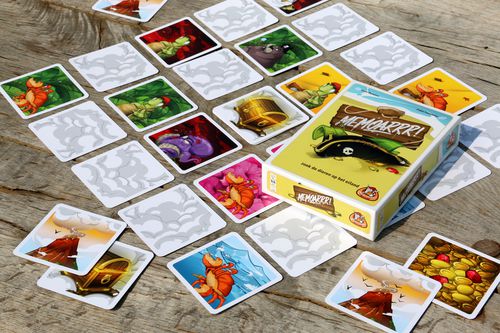Memoarr! (Boardgame)
 Memory based games are a great equalizer between young and old. Memoarr! starts out like most, with a grid of upside down cards. However, rather than matching pairs of cards, players attempt to create a chain of cards, with each card matching the landscape or animal of the previous one. The result is a memory matching game with just enough spin to mark it different from the others. It becomes more unique when using the advanced rules which has the cards triggering special actions based on the animal on the revealed card.
Memory based games are a great equalizer between young and old. Memoarr! starts out like most, with a grid of upside down cards. However, rather than matching pairs of cards, players attempt to create a chain of cards, with each card matching the landscape or animal of the previous one. The result is a memory matching game with just enough spin to mark it different from the others. It becomes more unique when using the advanced rules which has the cards triggering special actions based on the animal on the revealed card.
Memoarr!
Designer: Carlo Bortolini
Publisher: Stronghold Games
Players: 2-4
Ages: 8+
Time: 10-20 minutes
(review copy provided by publisher)
Memoarr! starts out like most memory games, with a 5×5 grid of cards placed face-down. Remove the center card (without looking at it) and fill the space with double-sided cards depicting a volcano, one less volcano card than the number of players. The main set of cards (non-volcano) consist of an animal (one of five possible ones) set against a background indicating a location. Then a unique thing happens. Players are given the chance to secretly look at the middle three cards (of the five) directly in front of them! Unlike standard memory games, Memoarr! Actually gives you a personal bit of information you can use as you wish! You are the only person who starts out aware of the pictures on those three cards. You can use them early to stay in the game or wait it out and maybe pull one out in a clutch moment.

The goal of the game is not to directly match two cards. Instead, players take turns flipping a single card in the hope of matching either the animal or background of the previously flipped card. If a player flips a card that has no match, they must take a volcano card from the center pile and are out for the round. Once the last volcano card is taken, the remaining player (who does not yet have a volcano card) takes the top card from a stack of treasure cards. All the cards are flipped face down again, but are NOT shuffled. A new round of play resumes, with the first player randomly determined by the number of birds on the previous round’s volcano cards.
The game continues in this way (never moving the face-down cards) through seven rounds.
When the seventh treasure card is taken, players flip up their treasure cards and count the rubies displayed (anything from 1 to 4 rubies per card.) Whoever has the most rubies wins the game. For those who abhor such randomness, the treasure cards can be stacked such that the more valuable cards are placed on the bottom – and are thus prizes won when most of the cards and known and the concentration required is greater.
As it stands, there are some unique aspects I appreciate, but with only a small addition to the rules, the game can be played with “expert rules.” They only add a small bit of complexity, so can be added in anytime players already have a game or two under their belt. The expert rules add in a special power for each animal in the game. When a card is (correctly) revealed, the revealing player may then use its special power. A penguin lets you secretly look at an unrevealed location. An octopus lets you exchange its card with any of the four adjacent ones (whether they’re face up or face down.) The walrus lets you tag a card that may not be revealed by the next player (they have to choose something else.) The crab gives the revealing player another turn (and another if they get another crab…) The turtle…. does nothing.

Verdict:
There is just enough here to stand out from other memory card games. The idea of “chaining” cards is somewhat new, the special powers are nifty, but what struck me the most was allowing players to get a pre-game glance at a subset of cards. This gives players a unique resource to use in the game. Do you reveal your cards early, or wait for an important opportunity later in a round? The three atypical aspects (chaining, special powers, foreknowledge) combine to make a memory game that is set apart from others of its ilk.
Since Memoarr! adds enough strategic options to the mix, it can serve as both a “kids” title and a quick game for the older set. The younger set tends to do well with memory games, giving adults a run for their money. Adding in the advanced rules gives just a flavor of strategy to keep adults interested, but no so much as to prevent young ones from doing well. Suitable to bring out for some family gaming, or for a quick game or two at the end of a “grown-up” session of gaming.
Kid Factor:
No words to read here, so if a child can flip a card and remember what’s on the back, we’re good to go. The “advanced” game where each animal character gives a special power slightly adds to the complexity, but not in a way that prevents even young kids (5+) from playing.





Discussion Area - Leave a Comment